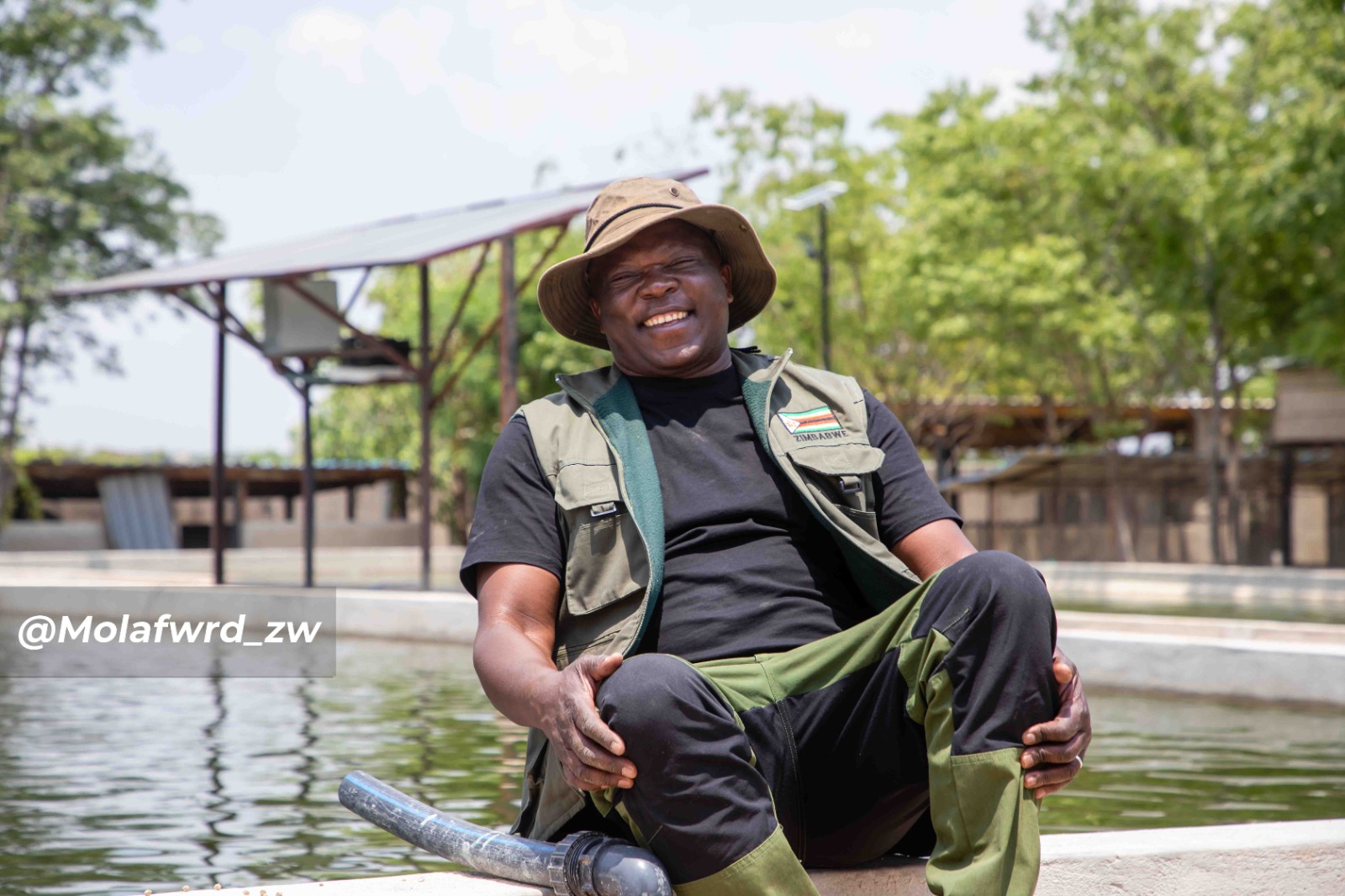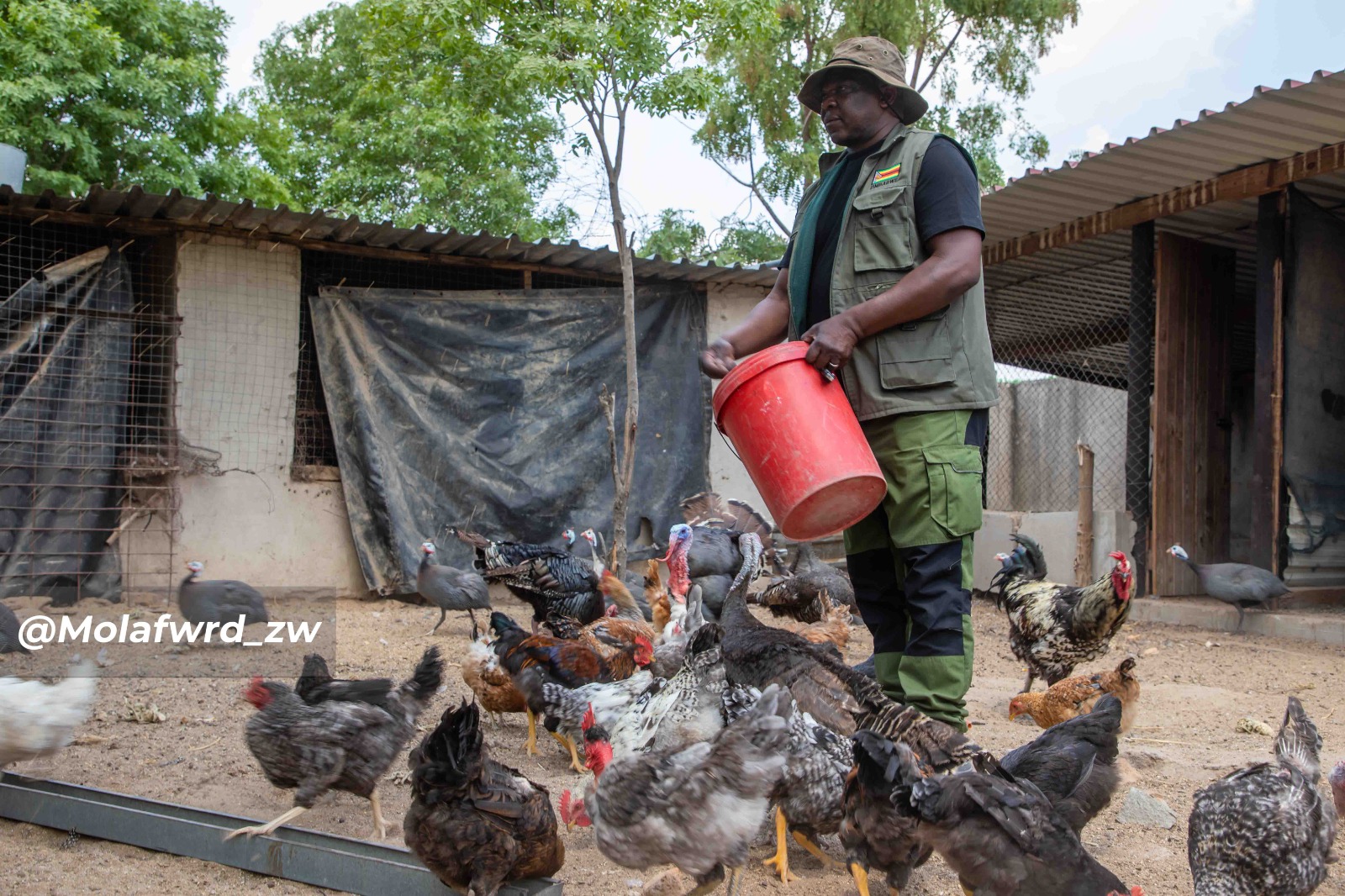Current Affairs
Seke District Sets the Pace in Sustainable Aquaculture — Champion Farmer Gift Jeche Leads the Way

The 2025 Fish Day celebrations in Seke District, Mashonaland East, were more than a ceremonial event. They highlighted how innovation, hard work, and community-driven learning are shaping a thriving and sustainable aquaculture economy.
The Fisheries and Aquaculture Resources Production Department (FARD), operating under the Ministry of Lands, Agriculture, Fisheries, Water and Rural Development (MLAFWRD) through its Agricultural Rural Development and Advisory Services (ARDAS), officially launched the new production season during the event showcasing Seke’s rapid progress and the inspiring story of local farmer Mr. Gift Jeche.
From Humble Beginnings to Model Farmer
In Dema village, Mr. Jeche has transformed his home into a model of modern fish farming. Beginning his aquaculture venture in 2016, he faced multiple challenges, including reliance on temporary dam liners that deteriorated over time. “I noticed the liners would crack after a few years,” he recalls. Determined to find a lasting solution, he switched to permanent concrete ponds a decision that laid the foundation for sustainable operations.
His well-established farm supports over 32,000 fish, mainly tilapia and catfish, providing a steady income throughout the year. What sets Jeche apart is his integrated farming system. Using an innovative water recirculation network, he keeps his ponds clean and oxygenated, while the nutrient-rich discharge water irrigates his banana, mango, and vegetable plots. Ducks also play a role in maintaining pond balance by controlling pests and enriching the water naturally creating a self-sustaining ecosystem.
Economic and Social Impact
Mr. Jeche’s business has grown into a profitable venture. He supplies top-quality fish to local markets and butcheries for about US$4.50 per kilogram, demonstrating that responsible, high-quality production can fetch premium prices. Yet, his greatest success may be his influence on others. “Fish farming has changed my life and inspired my neighbours. Many have started building their own ponds after seeing my results,” he says with pride.

Government Applauds the Initiative
Fisheries and Aquaculture Resources Production Director Mr. Milton T. Makumbe praised Jeche’s achievements, noting that his farm reflects the broader potential of Zimbabwe’s aquaculture sector. “Farmers like Mr. Jeche are the lifeblood of our fisheries revolution. His adoption of durable ponds and integrated systems demonstrates how sustainability and innovation can work hand in hand,” he said.
Mashonaland East ARDAS Provincial Director Mr. Masiiwa echoed this sentiment, urging other farmers to explore aquaculture as a viable business. “We’ve seen outstanding results in Seke,” he remarked. “Given land constraints in many areas, fish farming is an ideal enterprise for smallholders with access to water. The government, through our extension officers and business advisors, is ready to support farmers in adopting this billion-dollar industry in the making.”
Seke’s Growth Mirrors National Ambitions
Recent data from the Aquaculture Frame Survey shows that Seke now hosts 107 active fish farmers, making it one of the most dynamic aquaculture districts in Zimbabwe. Mr. Makumbe described this progress as “a strong foundation for the Presidential Community Fisheries Scheme — built on empowerment, inclusivity, and skills development.”
Nationally, Zimbabwe currently produces around 31,000 metric tonnes of fish annually against a domestic demand of 60,000 tonnes. Bridging this gap represents a huge opportunity for local farmers. Under Vision 2030, the government aims to expand the aquaculture sector into a US$1 billion industry, with districts like Seke leading the transformation.
Overcoming Challenges and Building Capacity
Despite this momentum, farmers continue to face issues such as poor-quality inputs and unregulated suppliers. Mr. Jeche himself suffered early losses due to defective liners. To address these problems, the Ministry is finalizing the Fisheries and Aquaculture Bill, which seeks to regulate suppliers, ensure access to certified fingerlings, and create fair market conditions for producers.
Beyond regulation, the Ministry is empowering farmers through training. The Aquaculture Business School initiative promotes hands-on learning in pond construction, feed management, and water quality monitoring — essential skills for building profitable fish enterprises. Peer learning, as practiced by Jeche and his mentees, remains central to spreading knowledge across communities.
A Vision for the Future
Seke District’s experience illustrates how collaboration, perseverance, and innovation can transform livelihoods. With ongoing government support and community-driven learning, the district has become a model for rural development. As Mr. Jeche concludes:
“Fish farming feeds my family, creates jobs, and gives hope to others. If we keep improving and working together, Zimbabwe’s aquaculture future is bright.”
Current Affairs
Minister Rwodzi Charts Path as Sector Takes Lead in GDP Growth

Itai Mazire
Tourism and Hospitality Industry Minister Barbara Rwodzi has implored players in the sector to embrace innovation, sustainability, and stronger partnerships to safeguard Zimbabwe’s tourism gains, as the industry now leads national GDP growth ahead of mining and agriculture.
In a speech delivered on her behalf by Tourism Permanent Secretary Dr. Takaruza Munyanyiwa at the Hospitality Association of Zimbabwe (HAZ) Summit and Annual General Meeting in Harare today, Minister Rwodzi said the country stood at a “historic crossroads” following its recent listing by Forbes as the best destination to visit in 2025.
“This is a well-deserved accolade which we should celebrate and sustain going forward. Congratulations, makorokoto, amhlope to the service providers of the tourism and hospitality industry of Zimbabwe.”
The Minister applauded the sector’s resilience in the face of pandemics, economic headwinds, and climate-related shocks, noting that the spirit of Zimbabwean hospitality remains unbroken.
“We have continued to smile, to serve, and to tell our authentic story, hence reaping the rewards now,” she said.
Giving an update on performance, Minister Rwodzi reported that international tourist arrivals grew by 9 percent between January and September 2025 compared to the same period last year, with strong traffic from the Americas, Africa, and Asia.
Domestic travel also surged by 20.9 percent over the same period, while the sector generated approximately USD 922 million in 2025 a 10 percent rise from the USD 839 million recorded last year.
“These are encouraging signs that our recovery is gaining positive traction. But future-proofing requires more than recovery it demands transformation,” she said.
Minister Rwodzi outlined five pillars she said would anchor the transformation of the sector: digitalisation; sustainable and climate-resilient tourism; human capital development; infrastructure and connectivity; and stronger branding and market diversification.
“The future of hospitality is digital,” she said. “We must move from brochures to big data, from paper-based booking to smart platforms.”
She urged operators to embrace online booking systems, virtual reality tourism aids, and other digital tools that enhance visitor experiences.
On sustainability, Minister Rwodzi said protecting Zimbabwe’s natural and cultural heritage was “not an expense it is an investment in the longevity of our industry.”
The Minister stressed the need to invest in human capital, calling on operators to work closely with academia to bridge skills gaps and develop tomorrow’s hospitality innovators. She highlighted the First Lady, Dr. Auxillia Mnangagwa’s gastronomy vision as a key avenue for elevating Zimbabwe’s culinary offerings.
On infrastructural development across the country, she said it remained central to competitiveness: “A tourist’s journey begins long before they reach our front desk — it begins on a road, a runway, or a mobile network.”
Minister Rwodzi reiterated that Government is committed to creating an enabling environment, pointing to the recent reduction of tourism fees by up to 50 percent to lower operating costs.
“Future-proofing cannot be achieved by Government alone,” she said. “The private sector is the engine of creativity, investment, and service excellence.”
Her call for collaboration was anchored on an African proverb which states that, “Tomorrow belongs to the people who prepare for it today.”
The Minister said the role of HAZ remained critical as Zimbabwe eyes increased international tourist inflows.
“The world’s eyes are turning towards Zimbabwe. We have the assets, we have the people, we have the passion so why not?” she said.
“To HAZ, your role has never been more critical. You are the unified voice of the hospitality industry. Your strength lies in your collective action.”
She said the ongoing summit provided a platform to “strategise, innovate, and build consensus” as the sector pushes towards Vision 2030.
“The potential is vast. The time is now. Let us build not just an industry, but a legacy,” said Minister Rwodzi.
Current Affairs
Apostolic Church Founder Paul Mwazha Dies at 107

Zimbabwe and the wider African Christian community are mourning the loss of Bishop Paul Mwazha, the revered founder of the Apostolic Church in Africa, who passed away today at the remarkable age of 107.
Bishop Mwazha, widely regarded as one of the continent’s most influential religious leaders, dedicated his life to the growth and spiritual guidance of his church, which boasts millions of followers across Zimbabwe and beyond. His teachings, rooted in faith, discipline, and community service, have left an enduring legacy that continues to shape generations.
The Apostolic Church in Africa under his leadership became a cornerstone of spiritual life in many communities, providing not only religious guidance but also social support and education initiatives. Church leaders have called for prayers as they prepare for national and regional mourning rituals.
Further details on funeral arrangements and memorial services are expected to be released in the coming days.
Business
Zimbabwe Bets Big on Biotech to Fuel Industrial Revolution


Dr. Eng. Willie Ganda
By Enia Dube
The Minister of Higher and Tertiary Education, Innovation, Science and Technology Development, Hon. Dr Fredrick Shava, has thrown his weight behind biotechnology as a key driver of the country’s industrialisation and modernisation agenda.
Speaking at the National Biotechnology Authority (NBA) Strategic Planning Workshop in Kadoma, Dr Shava urged the Authority to identify biotechnology-led opportunities that can boost national production and accelerate economic growth.
“Biotechnology serves as a key catalyst for NDS2 implementation, advancing inclusive economic growth, job creation, and sustainable industrial development,” Dr Shava said, emphasising the need to integrate biotechnology into national value chains to unlock a biotechnology-driven economy. He added that this would turn innovation into industry, knowledge into enterprise, and science into jobs.
The NBA has made notable progress in establishing a strong regulatory framework, promoting biotechnology research and commercialisation, and raising public awareness about the sector’s potential. The Authority has successfully commercialised products such as Mapfura wine and Cofsol cough syrup, and has several other biotechnology products in the pipeline.
Incoming NBA Board Chairperson, Professor Idah Sithole-Niang, echoed Dr Shava’s sentiments, emphasising that the Authority’s five-year strategic plan must meaningfully contribute to the attainment of Vision 2030. “This event marks a significant milestone in the Authority’s ongoing efforts to enhance the role of biotechnology in Zimbabwe’s socio-economic development,” she said.
The workshop aimed to realign priorities and resources in response to emerging technologies and global biotechnology trends, and develop a strategic roadmap to strengthen biotechnology as a key driver of Zimbabwe’s socio-economic transformation. The rapidly evolving global biotechnology landscape, including advancements in gene editing, bio-manufacturing, and climate-smart innovations, presents both new opportunities and challenges for Zimbabwe.
“We recognise the pressing need for an inclusive and forward-looking strategic plan that can navigate the complexities of the biotechnology landscape,” Professor Sithole-Niang noted. The workshop was attended by researchers, government officials, and NBA staff, who are optimistic about the potential of biotechnology to drive Zimbabwe’s economic transformation and achieve Vision 2030.
-

 Current Affairs1 week ago
Current Affairs1 week agoOperation restore order
-

 Crime and Courts2 months ago
Crime and Courts2 months agoMasasi High School Abuse Scandal Sparks Public Outcry
-

 Crime and Courts2 months ago
Crime and Courts2 months agoKuwadzana Man Jailed for Reckless Driving and Driving Without a Licence
-

 Current Affairs3 months ago
Current Affairs3 months agoMunhumutapa Day: Zimbabwe’s Newest Public Holiday Set for Annual Observance
-

 Current Affairs4 months ago
Current Affairs4 months agoBreaking: ZIMSEC June 2025 Exam Results Now Available Online
-

 Current Affairs1 month ago
Current Affairs1 month agoBREAKING NEWS: ZANU PF Director General Ezekiel Zabanyana Fired
-

 Current Affairs3 months ago
Current Affairs3 months agoGovernment Bans Tinted Car Windows in Nationwide Crime Crackdown
-

 Current Affairs2 months ago
Current Affairs2 months agoExposed: Harare GynecologistChirume Accused of Negligence, Extortion, and Abuse



